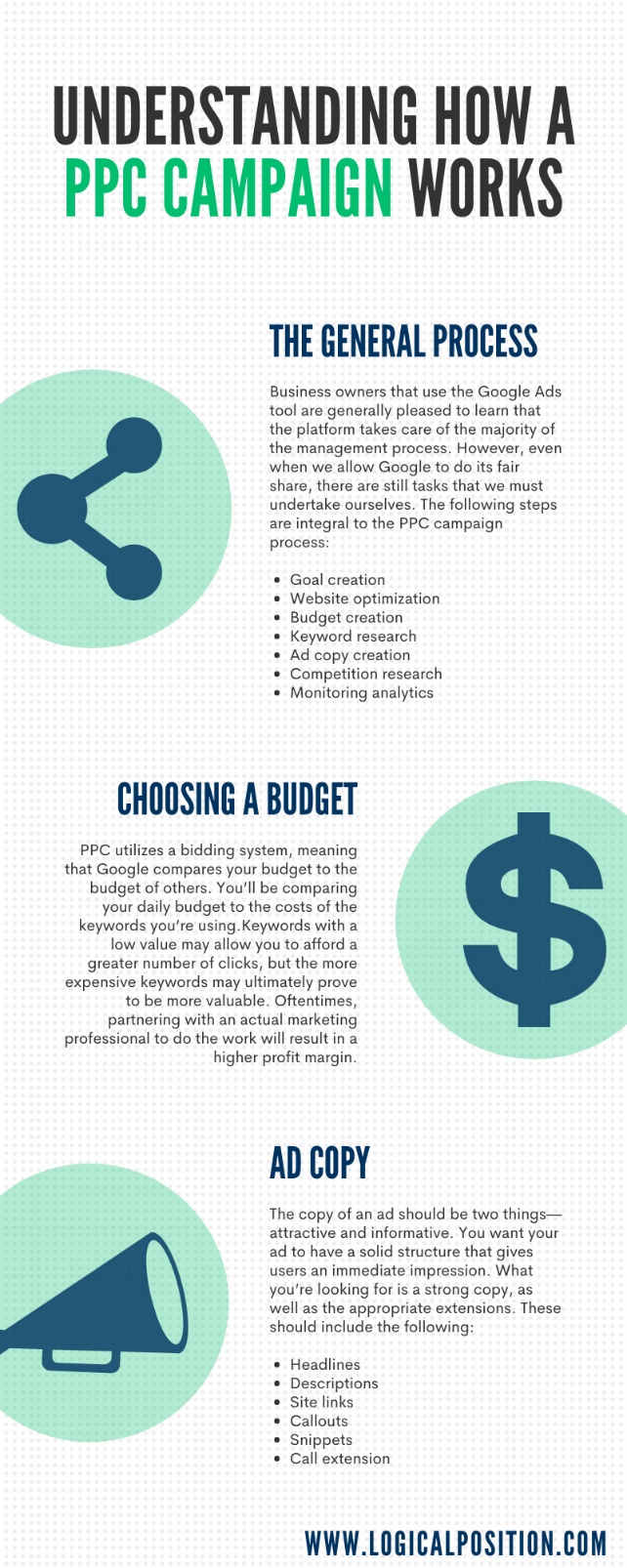PPC—known as Pay-Per-Click—is one of the most popular forms of digital marketing. When your ad is displayed, you aren’t paying for the actual visual aspect, but for the clicks it receives. Business owners will set the maximum amount they’re willing to pay for each click received, and the highest bidder ultimately takes the top spot.
A successful PPC campaign is one that creates valuable conversions, which happen as a result of a few different things. These include:
- Ad placement
- Strong copy
- A relevant landing page
- A call to action
- Pairing an ad with the appropriate keywords
In today’s article, we aim to give a brief outline of what goes into creating a successful PPC campaign. We hope that it helps you as you move forward in your marketing journey.
How Does Pay-Per-Click Advertising Work?
The first item to understand is how PPC advertising operates, as this knowledge is essential to understand how to craft your own campaign to provide the best results. In this section, we’ll go into the general process, choosing your budget, and creating quality ad copy.
The General Process
There are, naturally, several steps that go into creating your campaign. Business owners that use the Google Ads tool are generally pleased to learn that the platform takes care of the majority of the management process. However, this tool doesn’t always provide the best possible results when left to its own device. Even when we allow Google to do its fair share, there are still tasks that we must undertake ourselves. The following steps are integral to the PPC campaign process:
- Goal creation
- Website optimization
- Budget creation
- Keyword research
- Ad copy creation
- Competition research
- Monitoring analytics
When you put all these pieces together, you’ll create a picture of the ideal PPC campaign. If you remove even one of these pieces, your results will be a noticeably incomplete picture.
Choosing a Budget
Two factors impact how Google ultimately chooses to rank your ad. One of these is the quality of your link’s landing page, and the other is your budget. PPC utilizes a bidding system, meaning that Google compares your budget to the budget of others. When determining your budget, you have to identify how much you have to spend, as well as the amount of traffic you’ll need to reach your goal.
In a later section, we’re going to discuss keywords. Every keyword has a value in Google’s eyes, which is determined by the amount of traffic the query generates. Each keyword you focus on likely varies regarding how much they’re worth, and you’ll have to decide how much you’re willing to spend on each one you choose to target. You’ll be comparing your daily budget to the costs of the keywords you’re using. How many clicks your daily budget can generate is dependent on the amount you’re bidding. Keywords with a low value may allow you to afford a greater number of clicks, but the more expensive keywords may ultimately prove to be more valuable.
When you set your daily budget, as well as the keywords you wish to target, you may choose to hand the reins over to Google and let them do the rest. When you do this, they’re deciding when to display ads, which ones to display, as well as several other things. The issue with Google’s algorithm is that, while low-maintenance on your end, it doesn’t always give you the best results possible. Many business owners find themselves frustrated with the performance of their ads without realizing that there are more effective management solutions. Oftentimes, partnering with an actual marketing professional to do the work will result in a higher profit margin.
Ad Copy
The copy of an ad should be two things—attractive and informative. You want your ad to have a solid structure that gives users an immediate impression. What you’re looking for is a strong copy, as well as the appropriate extensions. These should include the following:
- Headlines: This is the first thing a user will see and is what contains the URL. This can include a few different things, including a brief look into what you’ll find on the landing page, the company name, or, for local businesses, a location.
- Descriptions: You don’t have a lot of space to work with when creating your description, so each character matters. You have a few words that need to be informative, relative, and ideally, have a call to action. Try A/B testing your description to see what works best.
- Site links: You may add a few additional site links to your ad. These may include contact or product pages.
- Callouts: These allow you extra text in which you may highlight a few extra incentives to click on your link. This could include sales, a promise of free shipping, or customization options.
- Snippets: This is a small area of text that educates users of specific products or services.
- Call extension: Fairly self-explanatory, this is simply your business phone number, oftentimes displayed alongside your site address.

How are Keywords Chosen for Your Campaign?
We talked about the bidding system and the value of keywords, but the amount you spend on keywords is useless if you aren’t targeting the correct ones. Here we provide a brief outline of how you can choose the correct keywords for your PPC campaign.
How Many Keywords Should You Target?
As many of us know, quantity is oftentimes not as valuable as quality. Some people may recommend not attaching more than 10 keywords to an ad, while others may inflate that maximum to 30. So which is correct?
While this may depend on the ad you’re running, less may be best. The reason for this is that if you’ve run out of your daily budget before your best keywords have the opportunity to perform, the campaign will shut off until the next day. Your budget has been spread thin, and those keywords have been used against you. It may benefit you to start with 10 to 15 keywords and analyze how each performs. You can then experiment with switching some out for others and determining which works best for your campaign.
Local vs. National Keyword Targets
Local businesses will naturally want to target a few local keywords, as many people looking for a specific service are looking for one near to their location. If one is looking to get their garage floor polished, they may type “garage floor polishing Snowflake, AZ” into the search bar. If you attach a good bid to that keyword, you have a high chance of receiving a click.
A DIYer looking to take on the garage job themselves may instead search for “garage floor polish”, which is a keyword that an e-commerce site may target on a national level. Due to the fact that national search terms tend to have a higher search volume, the keyword may be valued higher than a local one. The price for locational keyword values may also fluctuate depending on the value of an area. “Garage floor polishing” will almost certainly cost more in LA than it would in Snowflake.
Is Your Keyword Relevant to Your Landing Page?
Your bid is not always enough to send your ad to the top of the page—in most cases, Google also judges your placement by your quality score. While we don’t know everything that goes into determining a quality score, what we do know is that the relevancy of your landing page is a factor that Google considers. When a user clicks on a link, they naturally have an expectation for the content they’ll see. If their keyword is garage floor polish and they land on a homepage, or perhaps a page with epoxy instead, they’re going to feel disappointed and leave the site. Perhaps this polishis on the site somewhere, but your typical user isn’t going to spend the time filtering through the pages. They’ll instead click away and seek out their product elsewhere.
When you are choosing a landing page, ask yourself this: is it useful to the user? Are they likely to stay on your page? You can set a high bid on a keyword, but if your competitor’s bid is similar to yours and they have a higher-quality landing page, they may be the ones to secure that top spot.
How to Set a Goal for Your PPC Campaign
What’s a good strategy without a goal? If you have no idea where you want to go, the chances are that you won’t end up anywhere valuable. The size and type of goal will change drastically from business to business, but that doesn’t mean that we can’t all start with similar tools.
Google Analytics SMART Goals
We could spend a long time diving into this resource, which has proven to be incredibly useful for many, though here we’ll just provide a brief description. This tool allows business owners to collect their goals in one place and measure how to achieve them. Once you create your goals, Google’s algorithm will collect data and help you monitor how your physical results compare to your intended ones. SMART is an acronym that stands for the following important aspects of goals:
- Specific
- Measurable
- Achievable
- Relevant
- Time-bound
How to Set a Realistic Goal
Setting your goal is a difficult matter, as your task is to make one that’s both challenging and achievable at the same time. It isn’t uncommon for one to be ambitious and set a lofty goal only to fall short of it and become discouraged. We obviously can’t tell you what exactly your exact goal should be, but we can share a few tips for formulating one.
- Choose your goal before your actions: It’s important to know what your business needs before deciding how exactly you’ll get there. Do you want your business to grow by 2%? 4%? One of the very best ways to create a realistic goal is by prioritizing it over your strategy.
- Analyze previous performances: To plan for your future, you have to be aware of your past. A percentage comes with a dollar amount, and you can’t know what that is if you have nothing to compare it to. Take the time you need to completely analyze your past performances and use these as a starting point.
- Look at Your Competitors: When running a PPC campaign, you should be looking at your competitors every step of the way. Their performances may give you a foundation to work off of.
Measuring the Success of Your Campaign
Any business should consistently monitor the results of their campaign and be willing to adjust their strategy as needed. There are a few different ways that you can and should keep a constant eye on your analytics. Listed below are a few different items you should keep an eye on:
- Click-Through Rate: Your CTR is the measurement of how many people saw your ad vs. how many actually clicked on it. If 20,000 people saw your ad and only 800 clicked on it, there’s likely something you could improve about your ad.
- Your website’s quality score: Google assigns your site a quality score, which you’re able to see via your Google Ads account. If your site’s quality score is high, you can safely assume that your ad adheres to Google’s standards.
- Conversion rates: Your conversion rates are the number of individuals who visited your site as a result of your ad and proceeded to purchase a product or requested your services. If you’re receiving a fair number of clicks but no conversions, you need to evaluate why this is. It’s possible that you need to either improve or change your landing page and watch to see if this makes a difference.
- Cost per conversion: Conversions aren’t valuable if you’re paying more to receive them than what you’re actually earning. You need to keep a close eye on these in order to keep a smart budget. If they’re losing you money, there’s something in your strategy that you will need to change as soon as possible.
How Fast Can I Expect to See Results?
Once you set up a PPC campaign, you can technically see immediate conversions. With this in mind, however, most professionals say that you should give a campaign three months to truly evaluate how much earning potential it has. You need to give yourself, as well as Google, time to collect data and determine the best way to allow your ads to earn to their maximum potential.
During this time, you’ll want to do some split testing and try a few different methods. You’ll likely play with keywords, ad copy, and extensions. It’s difficult to tell if a campaign is working when you give it only one chance to perform well, which is why you need a fair adjustment period. After three months, your campaign may level out to a place where you can accurately judge your results. Ideally, your ads will perform well at this point and you’ll have more in your budget to further grow your campaign.
My Campaign isn’t Showing Results! What Now?
If your campaign isn’t working as well as you’d hope and you aren’t hitting your goals, don’t immediately rush into canceling it. There’s a good chance that there are a few things you could be doing differently, and we recommend that you test these before cutting your losses. Below are a few ways you can try to improve your campaign results:
How Logical Position Can Help Your Business
A PPC campaign done right can be an incredibly effective way to grow your business, but you will have to follow the best practices. PPC requires not only a monetary budget but also one for your time. You’ll need to constantly analyze results, create new strategies, and stay updated on updates to Google’s algorithm. This is where Logical Position can help you.
When you sign up with our PPC management company, our professionals will give you expert advice and take a substantial amount of work off your shoulders. We’ll respect your budget and let you know how to effectively use it through determining the level of campaign you need, as well as the keywords you should target. We’ll also take the management of your daily budget away from Google’s hands and monitor it ourselves—this may seem scary at first, but, as we’ve mentioned, Google doesn’t always know how to use your budget to its maximum potential. If their algorithm isn’t working properly, it’s essentially throwing away valuable funds. Here, actual experienced humans will analyze how your budget can and should be spent, and we’ll strive to allow it to perform accordingly.
Whether you’ve never had a PPC campaign, or you feel as if yours could be better, we want to help. If you contact us today, we’ll give you a free consultation and answer any questions you may have. We encourage you to get in touch and learn about what we can do for your business.



